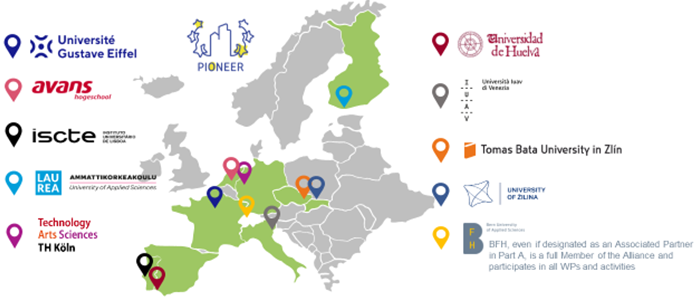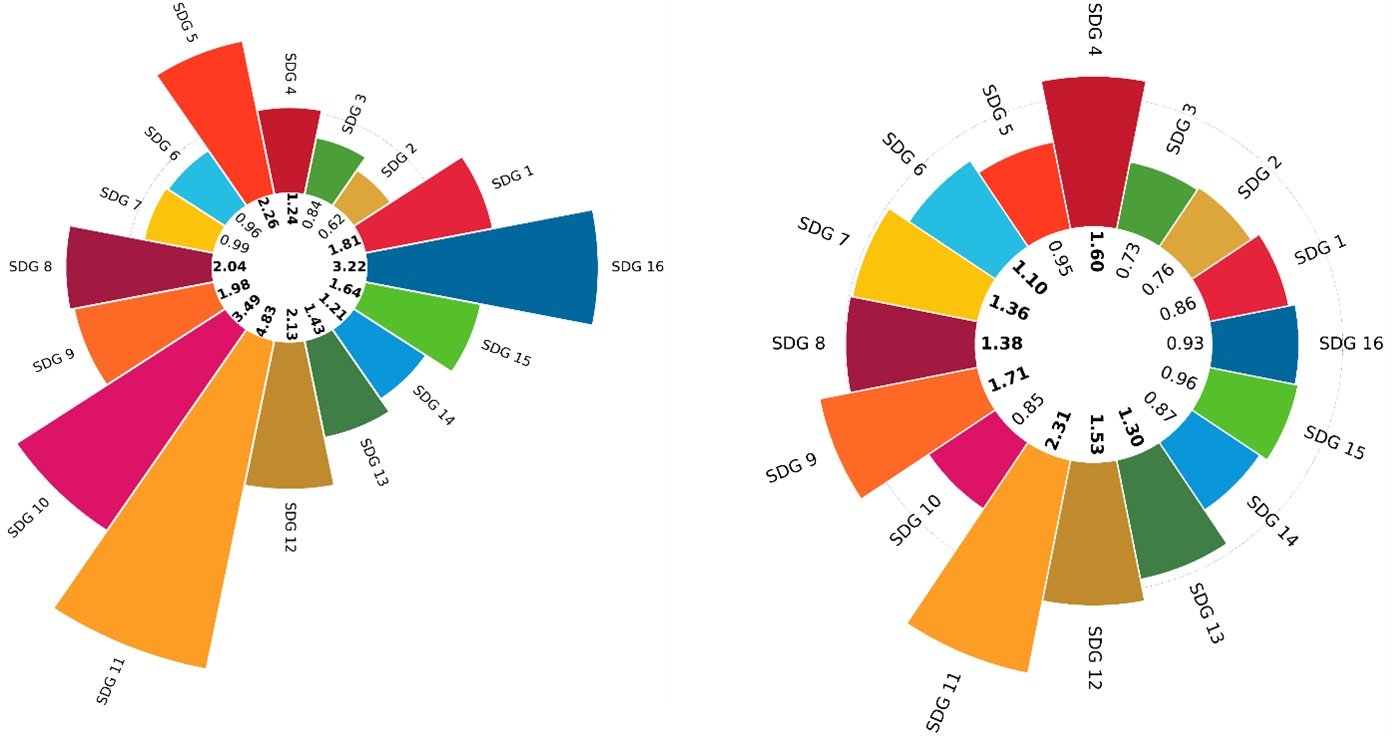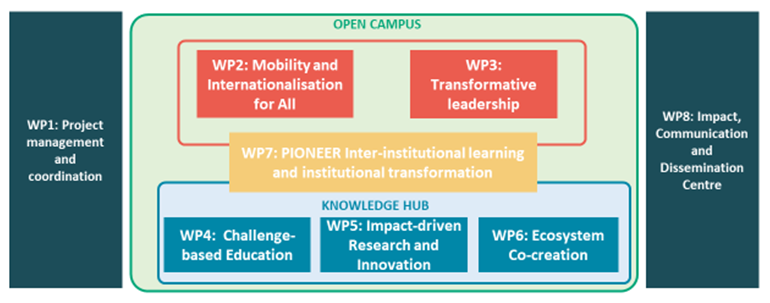Pioneering sustainable cities and communities
PIONEER leverages the European University Initiative to bring together our institutions in a federal organisation with a joint development strategy which provides a clear added value to inclusive, safe, resilient and sustainable cities.
Despite occupying less than 2% of the planet’s surface, cities are home to 56% of the world’s population and generate more than 80% of global GDP, according to the United Nations. They consume 78% of the world’s energy and 80% of the world’s food. 60% of greenhouse gas emissions come directly from cities, and indirectly, at least another 20% of emissions are caused by city dwellers. This is why the United Nations has dedicated one of the Sustainable Development Goals, SDG 11, to sustainable cities and communities, with the explicit mandate to make cities and human settlements inclusive, safe, resilient and sustainable. As the UN put it: “For all of us to survive and thrive, we need new, smart urban planning that creates safe, affordable and resilient cities with green and culturally inspiring living conditions.”
Progress on more than 50% of targets of the SDGs is weak and insufficient. This is a key concern for our students, staff and other key stakeholders, and one that we, as an institution, are committed to addressing. As an impact-driven European University Initiative with a clear competence in urban affairs, we accept our responsibility to better fulfil our mission to educate the citizens of the future and to engage partners and stakeholders to discover, co-create and implement new solutions by focusing on well-defined challenges.
To succeed, we can no longer work alone, but must come together at the European level, alongside our public and private partners. Together, we need to rethink the role of cities, not only as drivers of societal change, but also as beacons of sustainability.
We will help European cities to become more inclusive, safe, resilient and sustainable, as stated in SDG11, in order to realise their potential in the face of increasingly pressing challenges at European and planetary level.
SDG 11: Inclusive, Safe, Resilient and Sustainable Cities
- Inclusive cities: Marginalised communities, including refugees, the elderly, the economically disadvantaged and the disabled, are often excluded from the benefits of urban life, exacerbating socio-economic inequalities. Several aspects of inclusion should be considered to ensure that no one is left behind, in particular: spatial, digital, social, institutional and economic.
- Safe cities: This refers to public safety for residents. The UN goals mention safety in terms of safe public spaces, safe housing and safe transport[2]. This issue is closely related to inclusiveness, as the two are often strongly correlated.
- Resilient cities: The Joint Research Centre defines a resilient system as one that is "able to cope with shocks and persistent structural change in such a way that it continues to provide societal well-being without compromising that of future generations". There are four dimensions of resilience identified by the OECD: economic (e.g. diversification of industry and potential for innovation), social (e.g. civic engagement of local communities), environmental (e.g. ability of the built environment to withstand natural disasters) and institutional (defined as the ability of institutions to ensure "open, transparent and inclusive policy-making [...] and implementation").
- Sustainable cities: The European Commission calls for sustainable urban development by integrating the different aspects of urban life: environmental, economic, social and cultural.
Our ambition: to support cities in meeting their challenges as we transform ourselves
We are committed to two transformations that are two sides of our single mission.
To help cities thrive: Together, as PIONEER members, we will orchestrate our shared pan-European ecosystem of interfaces with the non-academic world, facilitate the exchange of talent, knowledge, skills and tools, build on our shared values and celebrate our diversity to positively impact our cities, our urban ecosystems and beyond.
To transform ourselves: A traditional academic set-up, with its national, disciplinary and sectoral silos and corresponding incentive systems, is not sufficient for our ambition. We will transform ourselves into impact and challenge driven institutions to foster collaborative problem solving with cities and relevant stakeholders.
Our values: cooperation, service to society and sustainability
PIONEER universities embrace common European values in their teaching, research and innovation activities in line with the European Strategy for Universities, published by the European Commission in 2022, and the Magna Charta Universitatum: human dignity, freedom, democracy, equality, rule of law, human rights, engagement with the communities we serve, sustainability, and intellectual and moral autonomy.
In the specific context of PIONEER, we also emphasise a set of key values that translate into principles for the design of our strategy:
- Cooperation. We recognise that we are key stakeholders in our local ecosystems and commit to strengthening our engagement with our partners in academia, public policy, the private sector and civil society.
- Service to society. As impact-driven universities, we are committed to supporting the needs of society.
- Sustainability. We work for the long term. Economic, institutional, environmental and social sustainability are therefore fundamental to all our activities.
Our alliance: shaped to address the challenges of cities
A common expertise and development direction
PIONEER brings together 10 universities, over 130,000 students and 17,000 faculty and staff across Europe. Our alliance of 10 impact-driven universities is shaped around our shared expertise in cities and ecosystem co-creation.
PIONEER is built on the ongoing collaboration between its members, both in terms of student exchanges and European research and innovation projects, and on our desire to take this collaboration further and develop activities that we could not undertake on our own. An example of this would be the strengthening of challenge-based education, which is central to our mission, the cross-boundary mutual engagement of ecosystems, and the power to tackle societal challenges that need to be addressed on a European scale, such as smart grids or the electrification of transport.

PIONEER Member institutions
A variety of urban settings to better anticipate and tackle the challenges of cities
Together, our ecosystems are a laboratory for the future. With campuses in 32 cities and 16 regions across Europe, our geographical breadth is matched by the diversity of the cities in which we are located: from megacities such as Greater Paris and polycentric conurbations such as Rhine-Ruhr, both with well over 10 million inhabitants, to medium-sized metropolitan areas such as Lisbon or Helsinki, to smaller cities with a wide range of profiles, from contemporary capitals such as Bern and historic capitals such as Venice, to smaller regional centres such as Breda, Huelva, Zilina or Zlin.
The plurality of our cities is also characterised by other dimensions, including the different economic and demographic profiles of the local communities, and is further enhanced by different languages and cultures. For example, the average age of the population ranges from 38 in Vantaa to 50 in Venice. This diversity provides us with a variety of environments and perspectives from which to test approaches and solutions to urban challenges. It builds on the vision of the Urban Agenda of the EU, and in particular the Amsterdam Pact, which stresses the importance of having "different cities of different sizes at the heart of the initiative".
We are thus defending the importance of considering the different realities of a diverse range of cities in order to address the challenges of urban development in Europe.
A clear alignment with the Sustainable Development Goals
Our ambition to address SDG11 - Sustainable Cities and Communities - is based on an in-depth analysis of our projects, publications, academic courses and institutional strategies. In this context, the alignment of both projects (see below) and publications towards a common goal is particularly important.
PIONEER is the alliance with the highest level of specialisation on SDG 11, both in terms of projects and publications. The following graphs show the specialisation of PIONEER in relation to the average European university (the light circle). This is a specialisation index, meaning that '1' represents the European average, '2' a relative weight of a subject within the research portfolio that is double the average, and '0.5' a weight that is half the average. We can see, firstly, that our contribution to the SDGs is significantly above the European average. Secondly, our strong expertise in sustainable cities and communities is also reflected in other SDGs where we are more specialised than the European average.

PIONEER’s specialisation in SDG’s: Horizon Europe projects (left) and Publications (right)
PIONEER will actively develop a service offer to cities, including the expansion of public policy advisory services and our contract research capabilities. All of these services stem from our ecosystem engagement activities.
Working together as PIONEER, we will reaffirm and strengthen our commitment to working closely with our partners. The associated partners of PIONEER, be they municipalities, private companies and/or civil society, will have access to the talent that is crucial to solving the challenges of future cities. Associate partners will also have access to research in line with their needs. They will benefit from the skills of students trained in key topics for the city of the future. By having access to a European alliance of universities, our associated partners will be connected to other similar and/or complementary actors from 32 European cities. For them, it is a unique opportunity to learn from good practices in places with complementary experience in tackling urban challenges across Europe. PIONEER will provide them with advisory services: public and private stakeholders will have the platform to approach PIONEER with their SDG11-related challenges.
PIONEER will be a one-stop-shop for stakeholders facing sustainable cities challenges, giving them direct access to the expertise of 10 universities across Europe. It will bring together 7 communities respectively focused on:
- Questioning urban transitions
- Nature in the city
- Sustainable and resilient cities
- Vulnerability, inclusion and health in the cities
- Mobility
- Digital transitions
- Energy in the city
The themes also feed into our future joint educational offer, providing the basis for the creation of joint European degrees and, equally importantly, providing material for the creation of transversal, interdisciplinary, challenge-based units that will be made available to all students in all our partner universities.
Our three strategic goals
Goal 1: Promote talent development and circulation
Knowledge circulation is at the heart of our mission, through the education of students, the co-production and publication of research results and their transfer to society.
We will open up our campus via 2 objectives that focus on mobility, cultural exchange and human capital development to facilitate learning within and across institutions:
- Objective 1: Foster a European approach to urban life and urban transition based on cooperation, exchange and talent mobility in a spirit of equality, diversity and inclusion.
- Objective 2: Offer tailored support for the development of leadership and human capital to broaden mindsets and enhance skills to address societal transitions in cities.
Goal 2: Foster challenge-based knowledge creation and transmission
To develop a truly holistic approach, it is necessary to strategically engage multiple perspectives in a challenge-based and transdisciplinary approach around carefully selected themes of urban transitions. Each theme can then be used to systematically connect the realms of education, research, and innovation to co-create solutions that foster inclusivity, safety, resilience and sustainability in cities.
This translates into three key objectives:
- Objective 3: Stimulate, develop and share challenge-based learning approaches in an interdisciplinary perspective tackling urban transition
- Objective 4: Facilitate and nourish society-oriented research and innovation that tackle urban transitions
- Objective 5: Co-create and disseminate solutions with urban, academic, economic, social and political ecosystems to address common challenges.
Goal 3: Transform incentives and institutional models
In order to fully embrace the impact potential of our students, teachers, researchers, administrators and technicians, universities therefore need to reduce existing barriers that impede mobility and limit our capacity to work together. This transformation will not only enhance our collective capacity but also facilitate mutual learning across member institutions and the pooling of resources, thereby ensuring that every member can reap the benefits. To achieve this, we have once again identified three key objectives:
- Objective 6: Build an efficient and sustainable governance and administration model for the Alliance.
- Objective 7: Orchestrate and embed inter-institutional learning and collaboration to enable the long-term alignment of strategies and institutional pathways.
- Objective 8: Share results and experiences to promote SDG11 and inspire the renewal of the European higher education and research landscape.
Our approach: Orchestration of engagement via thematic networks
As impact-driven universities, we co-create knowledge with relevant actors to ensure that it contributes to more sustainable communities and a more sustainable world. Our approach is the orchestration of thematic networks. For us, orchestration as a PIONEER approach involves implementing our overall mission by identifying and expanding initiatives in education, research or other academic dimensions (1) to resonate with a wider set of communities: students, local actors or faculty, or (2) to broaden their scope, thematic focus and relevance, or (3) to develop strong but underdeveloped areas.
Orchestration is the effort to develop and support existing initiatives, create new ones if needed, and coordinate the corresponding networks so that they support our common strategy and purpose: by helping us to identify and remove barriers, developing relevant participation and support schemes, etc.
Our work plan
Our work plan for the next 6 years focuses on consolidating the foundations of the PIONEER Alliance for its future development. This includes in particular the following elements which are translations of our 3 goals into a 6-year agenda:
- Developing the Knowledge Hub which encompasses our core activities in teaching, research and service to society;
- Developing the Open Campus which supports the core activities transversally;
- Establishing PIONEER’s long-term governance and implementing the orchestration approach.

Our work plan
The Knowledge Hub encompasses and coordinates our activities across our core missions of teaching, research and service to society. These activities focus on key enabling aspects: integrating a challenge-based approach to education, integrating a practice-inspired approach to research and innovation, and integrating these activities into an active outreach and co-creation approach with the urban, social, economic and political ecosystems of which we are part. The hub character signals that we are interested in the overlap of these three core activities, as shown in the graph in the previous section. This overlap is where our greatest potential lies, and this is what the Knowledge Hub is designed to foster.
The Open Campus brings all these aspects together by realising PIONEER as a physical, hybrid and virtual place. The campus will also support cross-cutting needs. Over the next 6 years, these will include mobility opportunities and intercultural experiences, as well as transformational leadership, the lack of which we have identified as a key barrier to more effective impact generation for academic institutions.
Our Alliance governance is focused on realising the potential of PIONEER as an inter-institutional learning opportunity and tool for institutional transformation. This includes, in particular, the orchestration approach, which will be progressively implemented at the Alliance level, but also at the level of individual campuses.
